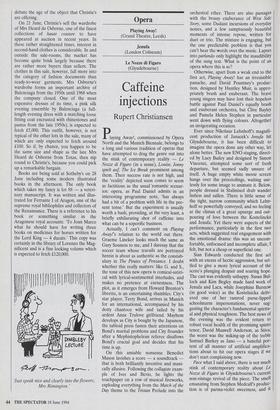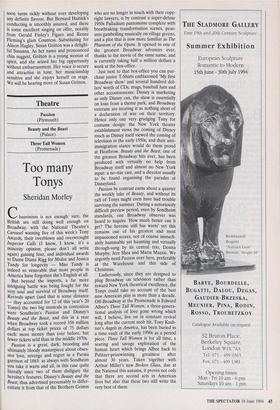Opera
Playing Away!
(Grand Theatre, Leeds) Jenufa (London Coliseum)
Caffeine injections
Rupert Christiansen
Paying Away!, commissioned by Opera North and the Munich Biennale, belongs to a long and various tradition of operas that have attempted to drag the genre out into the stink of contemporary reality — Le Nozze di Figaro (in a sense), Louise, Jonny spielt auf The Ice Break prominent among them. Their success rate is not high, and the 'reality' depicted soon comes to seem as factitious as the usual'romantic scenar- ios: opera, as Paul Daniel admits in an interesting programme note, 'has always had a bit of a problem with life in the pre- sent tense.' But the experiment is usually worth a bash, providing, at the very least, a briefly exhilarating shot of caffeine into what can be a soporific business.
Actually, I can't comment on Playing Away!'s relation to the world out there. Graeme Lineker looks much the same as Gary Souness to me, and I daresay that the soccer team whose travails are portrayed herein is about as authentic as the constab- ulary in The Pirates of Penzance. I doubt whether this really matters: like G. and S., the tone of this new opera is comical-satiri- cal with lyrical-sentimental interludes, and makes no pretence at earnestness. The plot, as it emerges from Howard Brenton's libretto, is an entertaining shambles. City's star player, Terry Bond, arrives in Munich for an international, accompanied by his dotty chantooz wife and tailed by his ardent Anne Trulove girlfriend. Mayhem develops as City is bought by the Japanese, the tabloid press fasten their attentions on Bond's marital problems and City flounder after a Mephistophelean referee disallows Bond's crucial goal and decides that his time is up.
On this amiable nonsense Benedict Mason lavishes a score — a soundtrack that is both brilliantly inventive and mani- cally allusive. Following the collagiste exam- ple of Ives and Berio, he lights the touchpaper on a row of musical fireworks, exploding everything from the Match of the Day theme to the Tristan Prelude into the
orchestral ether. There are also passages with the brassy exuberance of West Side Story, some Dadaist incursions of everyday noises, and a few sumptuously beautiful moments of intense repose, written for duet or trio. The mixture is engaging, but the one predictable problem is that you can't hear the words over the music. Lapses into parlando only highlight the inaudibility of the sung text. What is the point of an opera where this is so?
Otherwise, apart from a weak end to the first act, Playing Away! has an irresistible panache, and David Pountney's produc- tion, designed by Huntley Muir, is appro- priately brash and exuberant. The brave young singers may have lost their hopeless battle against Paul Daniel's equally brash and exuberant orchestra, but Clive Bayley and Pamela Helen Stephen in particular went down with flying colours. Altogether an invigorating occasion.
Ever since Nikolaus Lehnhoffs magnifi- cent production of Janacek's Jenufa hit Glyndebourne, it has been difficult to imagine the opera done any other way, let alone better. The new ENO staging, direct- ed by Lucy Bailey and designed by Simon Vincenzi, attempted some sort of fresh departure, but seemed sadly unsure of itself. A huge empty white movie screen hangs over the proceedings, waiting use- lessly for some image to animate it. Below, people dressed in Stalinised drab wander listless and sullen. There is little sense of the tight, narrow community which Lehn- hoff so powerfully conveyed, and no feeling at the climax of a great upsurge and out- pouring of love between the Kostelincka and Jenufa. Yet there were aspects of the performance, particularly in the first two acts, which suggested real engagement with the emotional drama: this was an uncom- fortable, unfocused and incomplete affair, I felt, but not a cheap or superficial one.
Sian Edwards conducted the first act with an excess of hectic aggression, but set- tled to give a more lyrical account of the score's plunging despair and soaring hope. The cast was evidently unhappy. Susan Bul- loch and Kim Begley made hard work of Jenufa and Laca, while Josephine Barstow (in good voice) as the Kostelnicka deliv- ered one of her ramrod purse-lipped schoolmarm impersonations, never sug- gesting the character's fundamental spiritu- al and physical toughness. The best news of the evening was the evident return to robust vocal health of the promising spinto tenor, David Maxwell Anderson, as Stiva; the worst was the miking-up of the treble Samuel Burkey as Jano — a baneful por- tent of all manner of artificial amplifica- tions about to hit our opera stages if we don't start complaining now.
Pace what I said above, there is not much stink of contemporary reality about Le Nozze di Figaro in Glyndeboume's current non-vintage revival of the piece. The smell emanating from Stephen Medcalfs produc- tion is of parma-violet sweetness, and it
soon turns sickly without ever developing any definite flavour. But Bernard Haitink's conducting is smoothly assured, and there is some excellent singing on offer, notably from Gerald Finley's Figaro and Renee Fleming's glam Countess. Substituting for Alison Hagley, Susan Gritton was a delight- ful Susanna. As her name and pronounced chin suggest, Gritton is a young woman of spirit, and she seized her big opportunity without embarrassment. Her voice is secure and attractive in tone, her musicianship sensitive and she enjoys herself on stage. We will be hearing more of Susan Gritton.



























































 Previous page
Previous page